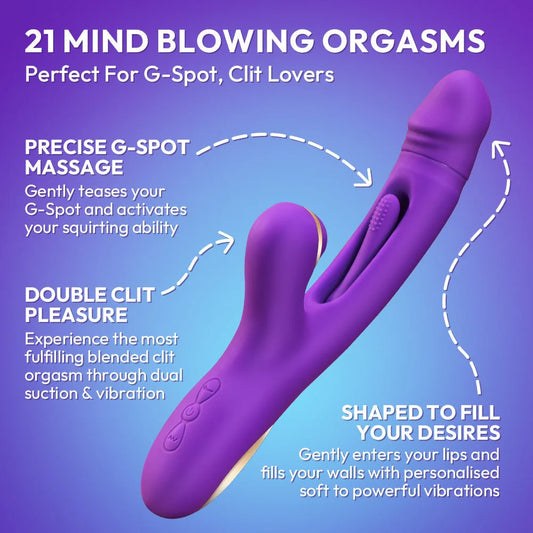When I was asked to write an article about same-gender fantasies, I immediately took it for granted that I would be writing about how to accept fantasies one is uncomfortable with. Perhaps I assumed that the bulk of the audience would identify as straight, or was simply responding to the fact that our world remains largely hostile to queer attraction. Whatever the reason, I am interested in addressing the hesitant imaginer because I think a rich and (more importantly) shameless fantasy world can be one of the more enriching elements of a person’s sex life.
So what is sexual fantasy? We often jump to the conclusion that fantasies illustrate something we’d like to do in ‘real-life’, that fantasy is aspirational. This is certainly the case sometimes. But this simplistic, causal explanation ignores other important functions of fantasy, such as providing a place to experiment with ideas we might like to pursue IRL or a safe realm for play in which we have complete control.
Thinking of fantasy in this way alleviates some of the guilt or confusion around motive and desire that can accompany fantasies that we feel are bizarre, improper, or ‘problematic’. Philosopher Aaron Smuts, who writes on the ethics of fantasy[3], similarly argues we shouldn’t assume any straightforward connection between fantasy and behavior, because there are many different reasons for fantasy. The limitless space of fantasy allows us to imagine doing things, to imagine enjoying doing things, that do not reflect our actual attitudes and inclinations. Sexual desires may come from unlikely, even unwanted places. Maybe they are enjoyable to think about, but strike no interest to fulfill. Or, they are only enjoyable so long as there is no chance of actually fulfilling them. There is a powerful narrative out there that says sexual fantasies reveal the deep dark truth of WHAT WE WANT, but it’s really not that simple.
When we think of fantasy as revealing what we would like to do in real life, fantasies that disrupt our sense of sexual ‘orientation’ can be very confusing. We think of ourselves as straight but find ourselves dreaming of same-gendered people; we assume we’re cisgendered but imagine taking on an entirely different body; we think we only like one kind of genitals but have persistent thoughts involving another kind; we’re convinced we’re only into topping femmes but keep fantasizing about being swept up by a masculine daddy; we are the gayest of gays but ponder having differently gendered lovers – how does any of this make sense?
A number of ideas around orientation remain pretty solid, despite how sexual norms have blurred over time. Sexual orientation is usually thought of as something innate, fixed, and static: you’re born with it, you can’t change it, and it stays the same throughout life. There is also a powerful belief that our orientation determines our gender presentation (masculine or feminine, butch or femme) and our ‘lifestyle’ choices. When we question the common sense of each one of these, it can open space for us to feel free and unperturbed by fantasies that contradict what we thought we knew about the gender of our desire.
So let’s start with the idea that orientation is innate. A study claiming that genetic marker Xq28 was the ‘gay gene’ was published in 1993[4], amidst a handful of other weak experiments (although the quest to explain the ‘cause’ of homosexuality dates back to the earliest days of sexology in the 19th century). This study was never replicated, but a degree of scientific interest in the question remains[5], and the notion of a hereditary or genetic predisposition to queerness has retained cultural significance. Indeed, for mainstream gay rights activism, the idea that orientation is innate and unchangeable is very valuable: if we can’t change it, we can’t rightfully be discriminated for it. It is, of course, also very valuable to eugenicists who want to eliminate homosexuality.
Contrary to gay rights movements that seek mainstream acceptance and assimilation, more radical queer politics have argued that the ‘why’ of queerness is irrelevant: true sexual liberation comes when all consensual relations and orientations are respected regardless of whether they are innate or chosen, fixed or in flux. Seeking the cause of queerness assumes that heterosexuality is natural, normal, and correct. This relegates non-hetero relations to the realm of deviancy and abnormality, an abomination for science to unravel. Queer movements are more interested in destabilizing this ‘natural order’ than in finding our place within it.
On the other extreme, lesbian separatist feminists argue that like culinary tendencies, one could train their tongue (no pun intended) and alter their desires in bed the way we acquire a new taste for anything. We can shift our orientation to match our politics, the claim goes, if we so choose.
Some people connect with the idea that they are and have always had a certain orientation. Others feel that their orientation is malleable, changes over time, or has nothing to do with gender or sex. My point here is not to invalidate anyone’s experience, but to suggest that how one views their orientation is an individual matter. I don’t think ‘orientation’ is universal or knowable. I do think we can waste a lot of time and energy worrying about it when that could be put to better use enriching our sexual worlds in other ways.
So is orientation fixed? Consider that the gender of our partners is but one aspect of who we are attracted to, and that who we are attracted to is but one aspect of our sexual preferences and desires. We like different types of sex depending on the partner, and this can change throughout our lives. Whether its the type of activities, the style of intimacy, the use of toys, the time of day, or many other variables: clearly our entire sexuality is not fixed from birth. We focus on gender as the foundation of orientation – but why? Is there any good reason to place more emphasis on gender than other elements of our desire? What does this mean for the myriad other choices we make every time we have or want sex?
The ‘coming out’ process reinforces the presumably fixed nature of gender and orientation. When people come out, it is often framed as our ‘realizing’ that we were queer or trans ‘all along’. We examine aspects of our past and rewrite them into commensurability with a ‘true’ but hidden or suppressed identity (I played softball, I hated dresses, I preferred GI Joe to Barbie…). Again, this certainly resonates for many folks, and I’m not interested in establishing one ‘truth’ in place of another. But the narrative is so expected that opposing narratives can be drowned out, shrugged off, or downright disbelieved. As with continued suspicion of the slippery and elusive bisexual, one must pick a side and stay there. Perhaps this will shift as non-binary genders and non-gender specific orientations gain in familiarity and legitimacy, but sadly that time is not yet.
And what of gender and lifestyle preferences? A lot of folks still hold onto the idea that gender style (masculine or feminine presenting, whether you are a chick or a dude, cis or trans) is linked to your orientation. What is true is that in a hetero world, queers often make use of gendered markers like hair, fashion, and mannerisms to flag one another. But beyond conscious fashion choices, people all over the orientation spectrum have and are attracted to people all over the gender spectrum. It may seem silly to belabor the point, but queers and hets of all walks of life have bodies, haircuts, dress styles, families, and ideas of a good Friday night that can’t be determined by who they like to sleep with.
So whatever your fantasies, your desires, and how you integrate those into your self-identification is entirely up to you. You may find, as I have, that you never arrive at clear-cut answers. While that can be messy, it most certainly isn’t boring.






















